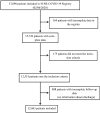Gender-Based Differences by Age Range in Patients Hospitalized with COVID-19: A Spanish Observational Cohort Study
- PMID: 33668766
- PMCID: PMC7956359
- DOI: 10.3390/jcm10050899
Gender-Based Differences by Age Range in Patients Hospitalized with COVID-19: A Spanish Observational Cohort Study
Abstract
There is some evidence that male gender could have a negative impact on the prognosis and severity of severe acute respiratory syndrome coronavirus 2 (SARS-CoV-2) infection. The aim of the present study was to compare the characteristics of coronavirus disease 2019 (COVID-19) between hospitalized men and women with confirmed SARS-CoV-2 infection. This multicenter, retrospective, observational study is based on the SEMI-COVID-19 Registry. We analyzed the differences between men and women for a wide variety of demographic, clinical, and treatment variables, and the sex distribution of the reported COVID-19 deaths, as well as intensive care unit (ICU) admission by age subgroups. This work analyzed 12,063 patients (56.8% men). The women in our study were older than the men, on average (67.9 vs. 65.7 years; p < 001). Bilateral condensation was more frequent among men than women (31.8% vs. 29.9%; p = 0.007). The men needed non-invasive and invasive mechanical ventilation more frequently (5.6% vs. 3.6%, p < 0.001, and 7.9% vs. 4.8%, p < 0.001, respectively). The most prevalent complication was acute respiratory distress syndrome, with severe cases in 19.9% of men (p < 0.001). In men, intensive care unit admission was more frequent (10% vs. 6.1%; p < 0.001) and the mortality rate was higher (23.1% vs. 18.9%; p < 0.001). Regarding mortality, the differences by gender were statistically significant in the age groups from 55 years to 89 years of age. A multivariate analysis showed that female sex was significantly and independently associated with a lower risk of mortality in our study. Male sex appears to be related to worse progress in COVID-19 patients and is an independent prognostic factor for mortality. In order to fully understand its prognostic impact, other factors associated with sex must be considered.
Keywords: COVID-19; SARS-CoV-2; Spain; coronavirus; gender differences.
Conflict of interest statement
The authors declare no conflict of interest.
Figures
References
-
- World Health Organization WHO Coronavirus Disease (COVID-19) Dashboard. [(accessed on 15 January 2021)];2020 Available online: https://covid19.who.int/
LinkOut - more resources
Full Text Sources
Other Literature Sources
Miscellaneous




